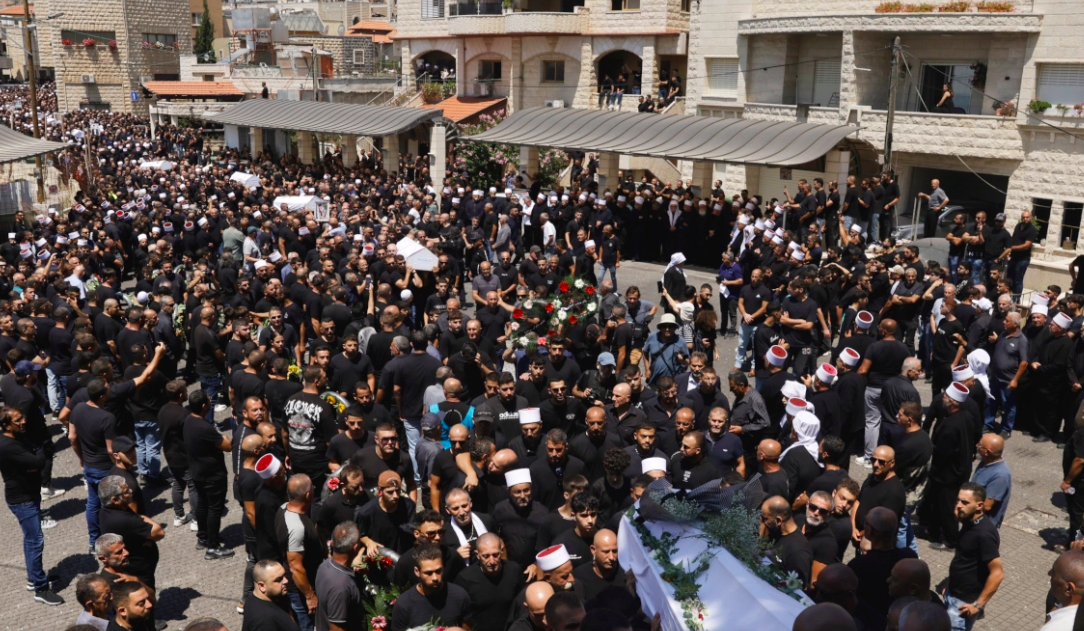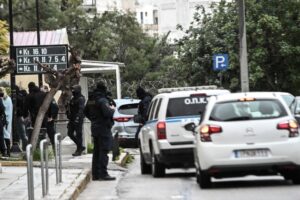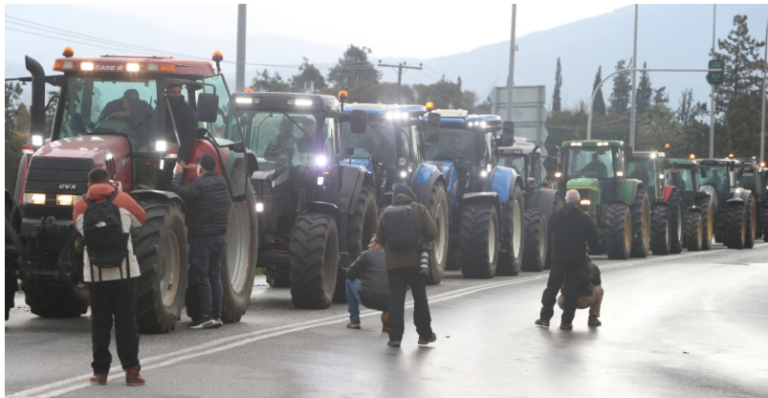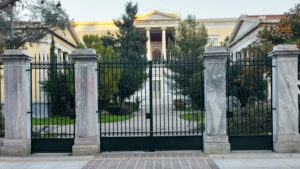Absolute grief prevails in Israel over the missile attack from Lebanese territory that hit an outdoor area in the Golan Heights, resulting in the death of 12 young children. This has not only triggered a counterattack by the Israeli Armed Forces but also a wave of concern about escalation in the region.
Notably, the Israeli Embassy in Athens posted a video from the children’s funerals.
“How do you organize a mass funeral for children near the border under the threat of rockets? Today, Majdal Shams in northern Israel mourns as it buries the 12 children killed by a Hezbollah rocket last night. Our hearts ache for the families. May their memory be eternal,” the post reads.
According to Israeli media, thousands of people attended the funerals of the 12 children and teenagers killed on Saturday night.
By Saturday afternoon, funerals for 11 of the 12 known victims had been held. Their identities have now been released by the Israeli army and the local Druze community. The victims are:
- Fajr Laith Abu Saleh (16)
- Ameer Rabeea Abu Saleh (16)
- Hazem Akram Abu Saleh (15)
- John Wadeea Ibrahim (13)
- Iseel Nasha’at Ayoub (12)
- Finis Adham Safadi (11)
- Yazan Nayeif Abu Saleh (12)
- Alma Ayman Fakhr al-Din (11)
- Naji Taher al-Halabi (11)
- Milad Muadad al-Sha’ar (10)
Government ministers attending the funerals were booed by the mourners, as reported by the Times of Israel. “You have no shame. A boy went to play football and didn’t come back home,” one man reportedly shouted at ministers Nir Barkat and Idit Silman, to which the crowd cheered in agreement.
Thousands from the Druze community gathered for the funerals. Crying men, dressed in traditional clothing, carried the white-covered coffins through the streets of Majdal Shams, where the attack took place.
Earlier, several women dressed in black abaya robes wept as they placed flowers on the coffins, an AFP correspondent reported.
The children were playing football and didn’t have time to flee.
This was the deadliest attack in northern Israel since the border fighting between Israel and Lebanon began on October 8, with the victims all aged between 10 and 20 years, said Israeli Defense Forces spokesperson Rear Admiral Daniel Hagari on Saturday night.
Jihan Safadi, the principal of Al-Manahil elementary school, where five of the children studied, told the Arab news site Panet that she cannot grasp the magnitude of the tragedy as she lost several of her students, with many others injured.
“I told my students before the summer break to enjoy their time, to go out and play, and to stay safe. The situation here is very difficult; parents are crying, people are screaming outside. None of us can comprehend what happened. I don’t know how I’ll get through this; I’m in contact with the families. The situation is extremely difficult,” she added.
Residents and journalists who reached the site described scenes of bloody carnage on the field. Despite a warning siren, the victims didn’t manage to escape in time.
The children “were playing football, heard sirens, and ran to take cover,” eyewitness Mourhaf Abu Saleh told Reuters. “It might have taken them about 15 seconds (to reach the shelter). But they couldn’t reach the shelter because the rocket hit the area between the field and the shelter,” he said.
Hezbollah is on high alert and has withdrawn from significant locations.
Meanwhile, Hezbollah is on high alert, according to two security sources speaking to Reuters, as tensions escalate following the deadly attack on the Israeli-occupied Golan Heights that killed 12, which Israel blames on the Shiite armed organization.
Hezbollah denies any responsibility for the attack. Security sources said that Hezbollah has preemptively moved away from some significant locations in southern Lebanon and the eastern Bekaa Valley in anticipation of a possible Israeli attack.
IDF responded later Saturday night by striking Hezbollah facilities, which denies initiating the attack.
According to reports, the targets included weapons depots and other infrastructures in Samrpiha and Burj al-Shemali near Tyre, the Bekaa Valley, and the areas of Kafr Kila, Rab al-Talatine, Khiyam, and Tayr Harfa in southern Lebanon.
The Israeli Foreign Ministry stated on Sunday that Hezbollah “crossed all red lines” with the deadly strike on the football field, killing 12 people, mostly minors.
“The massacre on Saturday constitutes a crossing of all red lines by Hezbollah. This is not an army fighting another army but a terrorist organization deliberately targeting civilians,” the ministry’s statement said.
The Foreign Ministry said that “an Iranian missile” caused the deaths “of our boys and girls.” “Hezbollah is the only terrorist organization with such rockets in its arsenal,” it said. “Israel will exercise its right and duty to act in self-defense and will respond to the massacre.” Israeli Prime Minister Benjamin Netanyahu earlier vowed that Hezbollah would “pay a heavy price.”
Mohammad Afif, a senior Hezbollah official, denied responsibility for the attack on Majdal Shams, speaking to Reuters. In a statement, the Iran-backed militant organization said it had “absolutely no connection to the incident,” blaming hostile media for “false claims.” Iran warned Israel on Sunday against what it called a “new adventure” in Lebanon, according to a statement by Foreign Ministry spokesperson Nasser Kanaani.
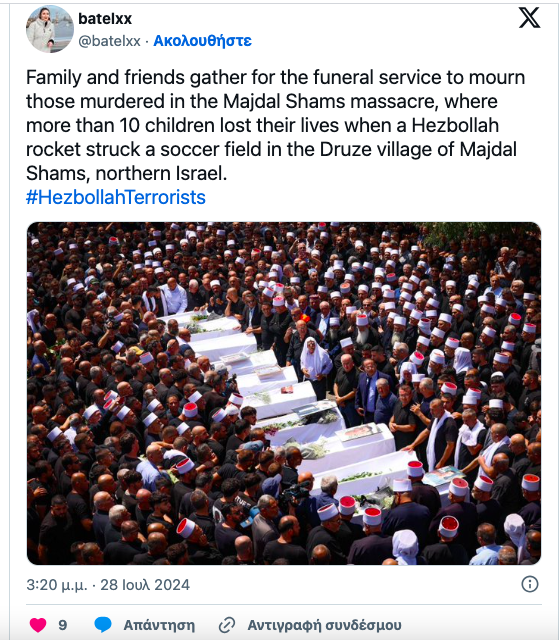
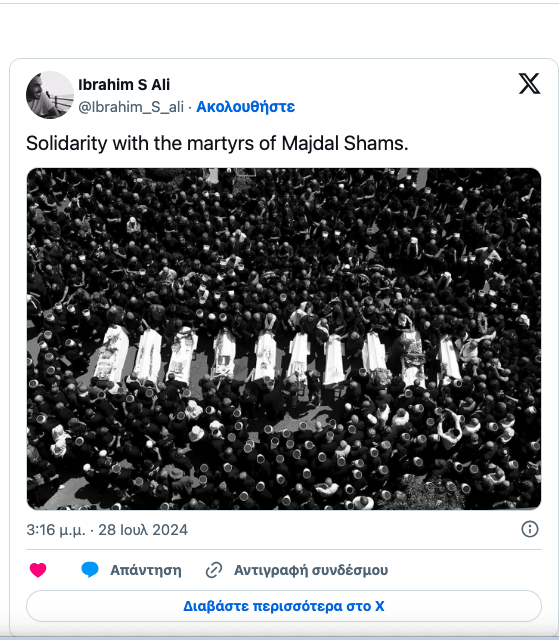
Fears of a dangerous escalation
The United States, leading diplomatic efforts to de-escalate the conflict at the Lebanon-Israel border (as well as arming Israel), condemned the attack as horrific but did not directly blame Hezbollah.
The White House statement said U.S. support for Israel’s security is unwavering and that they “will continue to support efforts to end these horrific attacks along the Blue Line, which must be a top priority.” The Blue Line refers to the border between Lebanon and Israel, monitored by the U.N. peacekeeping mission known as UNIFIL.
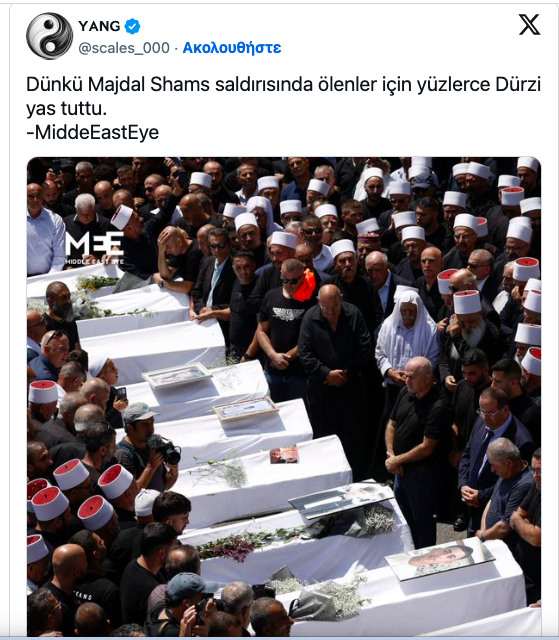
The U.N. special coordinator for Lebanon, Jeanine Hennis-Plasschaert, and UNIFIL commander Lt. Gen. Aroldo Lázaro warned that further intensification of attacks “could trigger a wider conflagration that would plunge the entire region into a disaster beyond imagination.” They urged maximum restraint from all sides, adding that they are in contact with both Israel and Lebanon.
Ask me anything
Explore related questions
